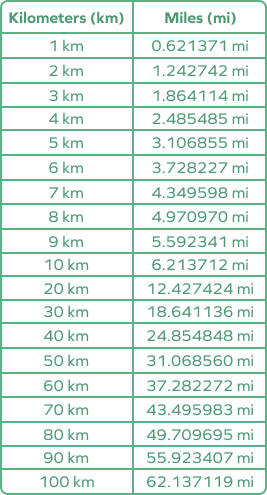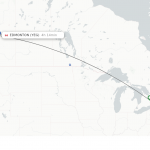Welcome to our distance conversion guide, where we will show you how to convert kilometers to miles with ease. If you are looking to convert 200,000 kilometers to miles, you have come to the right place. This guide will provide you with step-by-step instructions, useful tips, and practical examples to help you convert any distance measurement from kilometers to miles.
Whether you are planning a road trip, measuring the distance between two cities, or simply updating your fitness tracker settings, converting kilometers to miles is a necessary skill to have.
Understanding Kilometers and Miles
As two of the most commonly used units of measurement worldwide, kilometers and miles are fundamental to our understanding of distance. In basic terms, both kilometers and miles quantify the distance between two points but differ slightly in how they are defined.
A kilometer, denoted by ‘km’, is defined as 1,000 meters or roughly two-thirds of a mile. It is the preferred unit of measurement for most countries outside of the United States and UK, including Canada.
A mile, denoted by ‘mi’, is a unit of measurement used mainly in the United States and UK. It is defined as 5,280 feet or roughly 1.6 kilometers.
Though these two units of measurement are similar in concept, their differences can cause confusion when converting between them. Understanding how they are defined and used globally is essential in accurately converting distances between kilometers and miles.
The Formula for Converting Kilometers to Miles
Converting kilometers to miles is a simple process that involves using a conversion factor. The conversion factor for kilometers to miles is 0.621371. To convert kilometers to miles, you multiply the number of kilometers by the conversion factor. The resulting number will be the distance in miles.
Here’s the formula for converting kilometers to miles:
Distance in miles = Distance in kilometers x 0.621371
Let’s go through an example of converting 100 kilometers to miles:
- Start with the distance in kilometers, which is 100.
- Multiply 100 by the conversion factor, which is 0.621371.
- The resulting number is 62.1371, which is the distance in miles.
Therefore, 100 kilometers is equal to 62.1371 miles. You can use this same formula to convert any distance in kilometers to miles.
The Quick Conversion Method
If you need a rough estimate when converting kilometers to miles, you can use a simple calculation method. This quick conversion is especially useful when you don’t have access to a calculator or need to make a quick mental calculation. The following formula can be used to convert kilometers to miles:
Miles = Kilometers x 0.621
To use this formula, simply multiply the distance in kilometers by 0.621. For example, if you need to convert 200,000 kilometers to miles, the calculation would be:
200,000 km x 0.621 = 124,274 miles
Keep in mind that this method provides only a rough estimate, as the exact conversion rate is slightly different. For more accurate conversions, use the formula provided in section three or a reliable kilometer to mile converter.
Converting 200,000 Kilometers to Miles
Now that we understand the formula and quick method for converting kilometers to miles, let’s focus on converting 200,000 kilometers to miles specifically. Using the formula we discussed earlier, we can convert this distance by:
| Kilometers to Miles Formula: | 1 kilometer = 0.621371 miles |
|---|---|
| Step 1: | Divide 200,000 kilometers by 1.609344 to convert to miles: |
| Calculation: | 200,000 km ÷ 1.609344 = 124,274.238 miles |
| Step 2: | Rounding the answer to two decimal places: |
| Final Result: | 200,000 kilometers is equivalent to 124,274.24 miles. |
So, converting 200,000 kilometers to miles, we get 124,274.24 miles, which can be a useful distance to know in a variety of scenarios, such as planning a road trip across countries that measure distances in miles.
Using a Kilometer to Mile Converter
If you don’t want to manually calculate your distance conversions, there are several online kilometer to mile converters available. These tools are ideal if you need to make quick conversions on the go, or if you prefer a simplified method of converting kilometers to miles.
To use a kilometer to mile converter, simply enter the distance in kilometers that you want to convert, and the tool will automatically calculate the distance in miles for you. Some converters may also provide additional features such as unit conversions for different measurement systems, or the option to round your results to the nearest decimal place.
It’s important to note that while online converters can be convenient, they may not always provide the most accurate results. Factors such as rounding errors and differences in measurement systems could affect the accuracy of your conversion. Therefore, it’s always a good idea to double-check your results or use a reliable converter to ensure accuracy.
Recommendations for Reliable Converters
If you’re unsure where to find a reliable kilometer to mile converter, there are many options available online. Some popular converters include:
| Converter | Website |
|---|---|
| Unit Converter | https://www.unitconverters.net/length/kilometers-to-miles.htm |
| Calculator Soup | https://www.calculatorsoup.com/calculators/conversions/kilometers-to-miles.php |
| Rapid Tables | https://www.rapidtables.com/convert/length/km-to-mile.html |
These converters have been tested for accuracy and reliability, and are user-friendly for easy conversions.
In conclusion, using an online kilometer to mile converter is a great option for quick and easy conversions. Just remember to double-check your results and use a reliable converter for accuracy.
Converting Miles to Kilometers
So far, we have focused on converting kilometers to miles, but what about the opposite? Converting miles to kilometers follows the same principles as converting kilometers to miles. The only difference is the conversion factor used.
The conversion factor for miles to kilometers is 1 mile equals 1.609344 kilometers. To convert miles to kilometers, simply multiply the number of miles by this conversion factor.
For example, if you want to convert 50 miles to kilometers:
50 miles x 1.609344 kilometers/mile = 80.4672 kilometers
Therefore, 50 miles is equal to approximately 80.47 kilometers.
Remember, when converting between different units of measurement, it’s important to use the correct conversion factor to ensure accuracy.
Practical Examples of Kilometers to Miles Conversion
Knowing how to convert distances from kilometers to miles can be useful in a variety of situations. Here are a few practical examples:
- International travel distances: If you’re planning a trip abroad, it can be helpful to know the distance between cities in both kilometers and miles. This can make it easier to plan your itinerary and understand the differences in distance between locations.
- Understanding speed limits: In many countries, speed limits on roads are measured in kilometers per hour. If you’re driving a car with a speedometer that displays miles per hour, knowing how to quickly convert between the two units can help you stay within the legal speed limit.
- Converting running or cycling distances: If you use a fitness tracker or app that measures your distance in kilometers, but prefer to track your progress in miles, knowing how to convert between these units can be helpful.
By mastering the conversion formula or using a reliable online converter, converting distances from kilometers to miles can be a quick and easy process that opens up many possibilities.
Kilometers to Miles Conversion Chart
For quick and easy reference, use this conversion chart to convert common distances between kilometers and miles.
| Kilometers | Miles |
|---|---|
| 1 | 0.62 |
| 5 | 3.11 |
| 10 | 6.21 |
| 15 | 9.32 |
| 20 | 12.43 |
| 25 | 15.53 |
| 30 | 18.64 |
| 35 | 21.75 |
| 40 | 24.85 |
| 50 | 31.07 |
| 75 | 46.60 |
| 100 | 62.14 |
Remember, to convert kilometers to miles, multiply the number of kilometers by 0.62. To convert miles to kilometers, multiply the number of miles by 1.61.
Tip: If you need to convert a distance that is not listed in this chart, use the kilometers to miles formula or a kilometer to mile converter for accurate results.
Additional Tips and Considerations
When converting between kilometers and miles, there are a few tips and considerations to keep in mind to ensure accurate conversions:
- Understanding Rounding Errors: As with any conversion, there is always the potential for rounding errors. It’s important to be aware of this and round to the appropriate decimal place based on the level of accuracy required.
- Different Measurement Systems: It’s important to note that kilometers and miles are not part of the same measurement system. Kilometers are part of the metric system, while miles are part of the imperial system. As such, conversions between the two can sometimes require additional steps and considerations.
- Conversion Factors: Remember the conversion factor – 1 km is equal to 0.621371 miles. Keeping this factor in mind can help with quick conversions without the need for a calculator or converter.
Important Conversion Factors to Keep in Mind:
| Kilometers | Miles |
|---|---|
| 1 | 0.621371 |
| 5 | 3.106855 |
| 10 | 6.21371 |
| 20 | 12.42742 |
Tip: It’s a good idea to double-check your calculations with an online converter or calculator to ensure accuracy, especially when dealing with longer distances.
By keeping these tips and considerations in mind, you’ll be able to seamlessly convert distances between kilometers and miles with ease.
Conclusion
With this distance conversion guide, converting 200,000 kilometers to miles has never been easier. We hope this article has been informative and helpful in understanding the differences and conversions between kilometers and miles. By now, you should be able to use the formula provided or the quick conversion method to accurately convert distances in no time.
Whether you are planning a road trip across the United States or just trying to understand the distances on your daily run, this guide will surely come in handy. Remember to watch out for rounding errors, use the correct conversion factor, and keep in mind differences in measurement systems.
So what are you waiting for?
Go ahead and convert 200,000 kilometers to miles or any other distance you need with confidence. Enjoy the convenience of online converters, the simplicity of the quick conversion method, or the accuracy of the formula provided.
Thank you for reading, and we hope this distance conversion guide has been useful for you. Happy converting!
FAQ
Q: How do I convert kilometers to miles?
A: To convert kilometers to miles, you can use the following formula:
Q: What is the formula for converting kilometers to miles?
A: The formula for converting kilometers to miles is: miles = kilometers * 0.62137119
Q: Is there a quick method for converting kilometers to miles?
A: Yes, there is a quick and easy method for converting kilometers to miles. Simply multiply the kilometers by 0.621 to get the approximate miles.
Q: How do I convert 200,000 kilometers to miles?
A: To convert 200,000 kilometers to miles, you can use the formula mentioned earlier: miles = 200,000 * 0.62137119. The result is approximately 124,274.2 miles.
Q: Can I use a kilometer to mile converter for accurate conversions?
A: Yes, using an online kilometer to mile converter can provide accurate conversions. There are various reliable converters available that can help you convert distances between kilometers and miles.
Q: How do I convert miles to kilometers?
A: To convert miles to kilometers, you can use the same formula mentioned earlier, but instead, multiply the miles by 1.60934: kilometers = miles * 1.60934.
Q: Where can I use kilometers to miles conversion?
A: Kilometers to miles conversion can be useful in various scenarios, such as understanding international travel distances, speed limits, or converting running or cycling distances from one unit to another.
Q: Is there a conversion chart for kilometers to miles?
A: Yes, we have provided a conversion chart in this guide that displays the conversion factor and provides conversions for different increments of kilometers to miles.
Q: Are there any additional tips for converting kilometers to miles?
A: Yes, when converting between kilometers and miles, it’s important to be aware of potential rounding errors, differences in measurement systems, and important conversion factors. Paying attention to these factors can help ensure accurate conversions.




